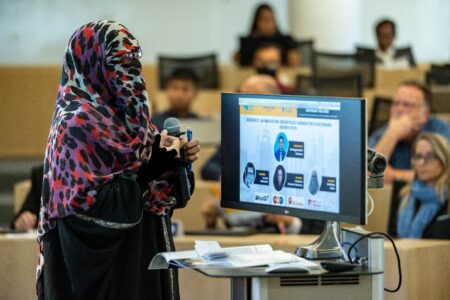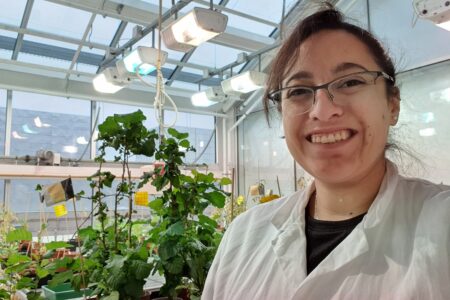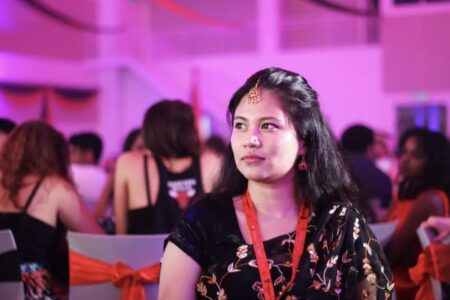
“Losing my hearing was the best thing that happened to me — it made me unique and, ironically, gave me the privilege of being heard,” shares 18-year-old Karen Youakim.
Hailing from Egypt but having lived in four other countries thus far, Youakim’s journey as a hearing-impaired International Baccalaureate (IB) Diploma Programme graduate is an inspiring one.
Deaf in both ears from a genetic condition called Mondini Syndrome — whereby an abnormality of the inner ear is associated with progressive, sensorineural hearing loss — Youakim’s unwavering determination and passion for learning enabled her to excel academically and personally.
Through the IB, she found the freedom to explore her passions and expand her creative and critical thinking to new heights.
“I started the IB when I was 16 years old, not knowing at the time what I wanted to study in university or what I wanted to do in the future,” says Youakim. “I liked that the IB offered a range of subjects, so I picked a combination that would keep my options open.”
Specifically, she chose Higher Level English Language and Literature, Biology, Psychology, Standard Level French B, Math AA, and Chemistry. In her final exams, she scored 42 out of the maximum 45 points.
The journey was far from easy though.
“I would be lying if I said the IB wasn’t challenging – as a matter of fact, I believe it is the most challenging academic programme I have ever done and will ever do,” says Youakim. “In my first year, I had to quickly learn how to manage my time and the large workload. It was a big jump from GCSE, and it took me a few months to get used to it. However, after I got into the flow of working efficiently and balancing all my subjects, I have to say I did have a lot of fun,” she shares.
Fortunately, she had the right help. In 2023, the IB supported nearly 13,149 students with various inclusive access arrangements through its access and inclusion policy.
“IB programmes are designed to ensure inclusivity, accessibility, equitability, and fairness, allowing all IB learners to have equal opportunities,” says Dr. Kala Parasuram, Senior Manager for Equity & Inclusive Education.
“For students with hearing impairments, arrangements such as access to lip reading for listening comprehension, the use of sign language and assistive technology for oral components, modified papers including Braille papers, sign language interpreter, and additional time for examinations are applied.”
It’s having support like these that gives people like Youakim a chance to fully immerse themselves into their interests outside of academics.
For Youakim, a self-proclaimed “activist in training,” that passion lies in volunteering, public speaking, and advocating for causes close to her heart. One specific cause she’s focusing on is with YUCAN, an award-winning youth and lived experience-led organisation that supports young carers from East London with 1:1 mentoring, workshops, befriending, homework support and respite opportunities.
“Young carers are children who have taken on care responsibilities because of their circumstances, and this cause is dear to my heart as I was once a young carer myself,” says Youakim, who discovered YUCAN at University College London, where she is currently pursuing her undergraduate studies in law.
While her IB days are behind her, we caught up with Youakim on how the programme helped her sharpen her skills to prepare her for university and beyond:

Karen Youakim (left) with her friends in their scouts uniform during their time completing the IB Diploma Programme. Source: Karen Youakim
How did the IB Diploma Programme help you explore your passions and sharpen your critical thinking?
Before I started the IB, I was very passionate about the early history of Christianity, especially the Ecumenical Councils in the early centuries of the spread of the church. Through the programme, I was able to dig much deeper into this topic of interest, choosing to write my Extended Essay (EE) on the Council of Chalcedon. The approach outlined by the IB for EE’s on World Religions allowed me to delve into the discipline with a new set of skills and competencies, allowing me to explore the Council of Chalcedon in an in-depth, analytical, and impartial way.
My Math IA aptly demonstrated the development of my critical thinking. In it, I explored whether the length of curly hair can be determined mathematically without the need to straighten hair and cause heat damage. This was a very creative way to assess a problem I had in my everyday life.
What were your most meaningful volunteer experiences, and what did you learn from them?
My most meaningful volunteer experiences involve kids. I love working with kids, and they teach you a lot — compassion, empathy, and patience, a lot of patience. I’ve been volunteering as a scouts chief for my church’s scouts team for the last three years. Every Friday, I work with a team of other leaders to give a group of 40-50 kids a lesson, lead them in an activity, and teach them some valuable skills they need for survival.
One of my favourite lessons that I planned was about waste management. Scouts certainly teach you how to be creative. For my activity, I had them build robots from recyclable items, and it was very cool to see what they created.
Another one of my favourite experiences was volunteering at an orphanage for children with special needs in Egypt. A lot of the children had been abandoned by their parents and were taken into the orphanage full-time. However, they were still happy, thankful, and full of love. That experience taught me that even if all you have to offer is yourself, your time, and your love, it will make a difference to someone.
How has public speaking been a tool for you to advocate for the causes you believe in? Did the IB Diploma Programme play a part in this?
Ever since I was young, I’ve been very outspoken and loud about my passions. I did my first speech when I was nine; it was about how I’d lost my hearing and how, regardless of this obstacle, I was thankful for the opportunities it gave me. Since then, I’ve been giving speeches about anything and everything.
In 2021, I gave a TEDx talk titled “The Power of Your Voice.” It frustrated me immensely to see so many people with the privilege to speak up and make a difference not doing anything about it, so I gave a talk.
The Confirmation of Acceptance for Studies (CAS) requirement of the IB inspired me to take on more public speaking roles to fulfil CAS’s creativity and service aspects. The IB not only gave me inspiration for ways to talk about the causes I’m passionate about but also helped me elucidate my passions in a channelled way that made an impact.
And while I’ve been doing speeches on various topics since I was nine, the IB was the first time I had proper exposure to structured debate, an essential skill for any advocate and especially useful for my law degree.
In English Language and Literature, I would always take the opportunity to play “devil’s advocate” and argue on behalf of the less popular opinion. It taught me to be open-minded and to consider where my own biases come from, how to challenge them, as well as how to be sensitive to other people’s opinions. In Theory Of Knowledge, there was never a “right answer” — I had to learn how to support my arguments with concrete evidence and detailed explanations to make a point.

Karen Youakim speaks at the launch of Dubai Dhoh Society, one of the societies she started. Source: Karen Youakim
Overcoming challenges is a significant part of your story. How did you find the strength and determination to pursue your dreams and successfully complete the IB Diploma Programme while being hearing-impaired?
Most people see my hearing loss as a challenge, and while at times it has been challenging to navigate life with certain disadvantages, my hearing loss is an advantage.
I remember having a conversation with a friend where I told her that I didn’t understand why everyone made a big deal about my achievements simply because I was deaf. She told me that if I had given up, been exhausted and hopeless, and decided to quit, I would be fully justified, more than anyone else.
That’s when I realised that the expectation for disabled students is failure. Most people don’t realise the strength it takes to be on even ground with everyone around you, let alone excel. I wanted to be an example. I didn’t want to be underestimated, excused, or left behind. If I was forced to be unique because of my hearing loss, I wanted to be remembered for being the best.
That is what has motivated me and given me the strength to keep going — the knowledge that someday, someone like me will be able to look up at my achievements and think to themselves that they, too, can do it.
What advice do you have for other students who aspire to follow their dreams and make a difference in the world?
Don’t listen to anyone telling you you can’t do it. If I had listened to the dozens of people telling me I couldn’t work harder, pursue specific goals or achieve achievements, I wouldn’t be where I am.
Sometimes, even the people with the best intentions don’t realise your potential. In trying to protect you, they prevent you from achieving what you can.
What are your future goals and aspirations? How do you envision continuing to make a positive impact on the world?
Once I have my law degree, I aspire to work in social mobility, welfare, or human rights law, actively making a difference in people’s lives in my career.
My dream is to one day open a series of charities specifically for children with special needs in poorer countries who can’t afford the care they need to achieve their goals. I recognise my privilege — I am beyond lucky to have my cochlear implants and to be able to pursue my goals with minimal disadvantages. I know that not everyone has the same privilege, and my dream is to minimise this gap by giving every child the chance to be remarkable.

Dr. Kala Parasuram is the Senior Manager for Equity & Inclusive Education at the International Baccalaureate. Source: Dr. Kala Parasuram
We also caught up with Dr. Parasuram to learn more about how the IB accommodates persons with disabilities:
What are the three key ways the IB reduces barriers for deaf students pursuing the IB Diploma Programme?
The IB is committed to creating an inclusive and accessible learning environment where all students can thrive. For that reason, the IB’s Education Office includes an Equity and Inclusive Education team specifically tasked with supporting all IB students who face barriers to their learning, teaching, and assessment. The IB’s curriculum and assessments are carefully designed and developed with accessibility and inclusivity as core principles.
As outlined in the IB’s Access and Inclusion Policy, inclusive access arrangements are applied during learning, teaching, and assessment to remove or reduce barriers.
For students with hearing impairment, the policy includes key inclusive access arrangements.
For example, it provides access to lip reading for listening comprehension. For IB assessments, a transcript of the listening comprehension examination is delivered to the school by the IB. There is detailed guidance available in the policy for script readers (for lip reading) which includes script reading guidance for different script scenarios, such as when there is a dialogue between two characters (that may necessitate two script readers or a single designated reader providing a visual cue to a change in character) or when the script contains information about a sound.
It also provides for the use of sign language and assistive technology for oral components and a communicator to clarify instructions or directions for written examinations. There is also additional time for students who require this access arrangement for their examinations, such as if they have barriers to language stemming from their hearing impairment.
Can you please share examples of how the IB Diploma Programme accommodates the diverse needs of students with disabilities?
IB programmes are designed to ensure inclusivity, accessibility, equitability, and fairness, allowing all IB learners to have equal opportunities for learning pathways, learning experiences and educational recognition.
From the outset, the IB applies universal design principles when developing the Diploma Programme (DP) curriculum and assessments, ensuring that the widest cohort of students can access learning, teaching, and assessments.
However, the IB recognizes that some students may require additional support to overcome specific barriers to their learning. For this reason, the DP considers and make provisions for access and adaptations for specific group of students where required at both curriculum and assessment levels. The IB has also published policies and guidance to support inclusive education within the DP at IB World schools. Moreover, the IB’s learning and teaching resources outline pedagogical approaches designed to reduce and eliminate barriers, addressing the diverse learning needs of all students.
These accommodations are guided by the IB’s Access and Inclusion Policy, which aims to reduce and remove barriers during learning, teaching and assessments by providing inclusive access arrangements. Among these inclusive access arrangements, students benefit from flexibility in duration, such as additional time, rest breaks or extensions to submission deadlines.
The policy provides flexibility in the presentation of material such as modified papers including Braille papers, sign language interpreter, the text of audio content, image descriptions, adaptations for colour blindness, reading software, and reader.
There is also flexibility in response methods, such as using a scribe, a word processor, speech recognition software, a graphic organiser, or transcriptions. Students can have additional human assistance such as a reader, scribe, prompter, or practical assistant.
Can you please share examples of inclusive education practices in IB World Schools?
The IB is committed to inclusive education, and all IB schools are required to create an Inclusion Policy. A few examples of a range of inclusive education practices in IB World schools are:
- An IB World School in Mumbai, India, had their first-ever student with vision impairment enrolled in their DP programme a couple of years ago. The school learnt how to make provisions for the student to access learning and teaching in their DP programme. The school worked closely with the IB in line with the IB’s Access and Inclusion Policy, and the student used inclusive access arrangements such as material in Braille, screen reading software, tactile diagrams, image descriptions of visuals, scribe and additional time. The same arrangement was provided in their IB examinations. The student successfully completed the DP programme and is now at university. You can learn more here: Inclusive education: Student with total vision impairment shares his IB experience | IB Community Blog (ibo.org)
- A student with selective mutism was encouraged to use assistive technology to communicate. This enabled them to not only participate in their learning and teaching but also broke their social isolation. The student also used assistive technology for their IB oral examinations and successfully completed their DP programme.
- A student with autism and anxiety was given exit cards to leave the classroom when they felt anxious or triggered and needed a break. The student was supported to learn to go to a designated quiet space and calm down. The student was also allowed to knit in the classroom as that also helped them calm down especially during learning and teaching of oral components. Also, for their IB assessments, the student used rest breaks and the request to knit during their oral examinations was approved by the IB.
- A student who had a gender reassignment surgery was supported by a school for all their social and emotional difficulties. The student would not talk at all as the voice was their male voice rather than the reassigned female voice. The school understood this and supported and reassured the student through this emotional turmoil. The school approached the IB for a solution for the oral examinations. Since the student was slowly responding to therapy, it seemed like an extension to the submission deadline would help the student. The IB approved an extension until the session’s close, which is two months after the release of results. In this way the school and the IB worked together to make provisions for the student.
- A school put in place a unique inclusive access arrangement for a student with significantly low vision for their learning, teaching, and assessments in Mathematics. The teacher used a plain whiteboard and took pictures when the problem was complete. The larger format and being able to see all the steps of a problem at once helped the student keep the flow of problems and the steps in order, in time.
- The student used the same method to work on math problems on a whiteboard during assessments. Being a very visual, spatial student and a talented artist, this method worked best for the student to succeed in math in the time allotted.










